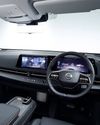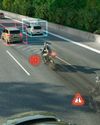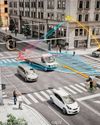The 2017 Jeep Compass has been newly built ground up. The American manufacturer’s first locally produced product looks like a baby Grand Cherokee, and is based on the ‘compact wide’ architecture that underpins the smaller Jeep Renegade. Fiat Chrysler Automobiles, Jeep’s parent company, knows well that its success in the Indian market weighs heavily on how the Compass fares in the market. We drove the Compass during the early monsoon showers in Goa – just the right time and place to experience an off-roader. Did we come back impressed? Read on.

Considering the growing interest in compact SUVs among the Indian consumers, Jeep decided to produce the Compass at FCA’s Indian plant in Ranjangaon, near Pune. In addition to the domestic market, FCA will also export the Jeep Compass to all right hand drive markets globally. Clearly, there’s a lot riding on the Compass, and the company is aware of that.
In India, there was a definite urgency to get the Compass rolling. From the time it was decided to start production in India, to the actual roll-out, it has just taken the team 23 months – a feat that is not lost on anyone at Jeep India. This, of course, required a coordinated approach among all functions, and they have delivered a product that is ready to be introduced to the market shortly.
Please refer to our technology feature on the Jeep Compass published in May 2017. This article, meanwhile, assesses the performance on the vehicle, both on and off-road.
PERFORMANCE
This story is from the {{IssueName}} edition of {{MagazineName}}.
Start your 7-day Magzter GOLD free trial to access thousands of curated premium stories, and 9,000+ magazines and newspapers.
Already a subscriber ? Sign In
This story is from the {{IssueName}} edition of {{MagazineName}}.
Start your 7-day Magzter GOLD free trial to access thousands of curated premium stories, and 9,000+ magazines and newspapers.
Already a subscriber? Sign In

Sound Generation For Enhanced Road Safety
With an ever-increasing number of fully electric and hybrid vehicles entering the market, we are witnessing a change in the acoustic experience in and around the car. The silent nature of the electric powertrain means that other road users miss the familiar acoustic cues that warn them of an approaching vehicle. To remedy this situation, Harman is working on various noise management solutions.

OBJECTIVE ASSESSMENT OF THE SAFETY CONTRIBUTION OF TODAY'S AUTOMOTIVE HEADLAMPS
Good lighting makes a major contribution to road safety. In 2011, the International Commission on Illumination (CIE) presented an evaluation system for headlamps that can objectively assess the quality of illumination and glare limitation. New light sources like LEDs and lighting functions (glare-free high beam, partial high beam) have been available for several years, so that an extension of the proven CIE method is necessary, which takes into account, among other things, changed switch-on and service lives of new lighting functions and represents a generally understandable evaluation system. An evaluation system presented in the following by the Technische Uni versität Darmstadt, which was developed by an encompassing expert commission, is intended to provide representative data and enable an objective evaluation of headlamp performance.

RAPIDO RE-INNOVATES TO CATER TO POST COVID-19 LAST MILE CONNECTIVITY
The rapid pace of urbanisation in the country has witnessed cities expanding and subsuming surrounding villages and smaller towns, evolving into Tier II and III cities.

FUNCTIONAL SAFETY STANDARDS TOP PRIORITY FOR FUTURE AUTOMOTIVE DEPLOYMENT
Increasing levels of electronic content in vehicles result in a large amount of software that is required to run the scenes behind the mechanical aspects of a vehicle. Electronic systems in automobiles are part of every section, from the powertrain to comfort and convenience systems as well as all types of safety equipment. This makes electronics and the software running these systems a critical part of the equation for future mobility solutions. In addition, putting standards in place to measure methods of developing, testing and functioning of such electronic systems also becomes highly relevant.

“BYD'S EV STRATEGY TO ENCOMPASS MOST FORMS OF TRANSPORTATION NEEDS IN INDIA”
The country’s electric vehicle (EV) ecosystem is grappling with a plethora of challenges even as it is striving to wriggle itself out of the ‘nascent stage’ tag. In an exclusive chat with Auto Tech Review, Zhang Jie Ketsu, Executive Director, BYD India shares his perspective on the current EV scenario and how the company intends to progress faster in the Indian automotive industry

SAFETY IN ELECTRIC AND AUTONOMOUS CARS – SIMULATION OF COMPLEX CRASH SCENARIOS
Electric and autonomous vehicles allow for novel seating arrangements and packaging strategies, presenting new safety challenges. Physical crash testing must be supplemented with virtual simulation to ensure vehicle safety on shorter development cycles. With its Simcenter Madymo MBS software, Siemens provides improved runtimes and the Active Human model, enabling accurate and rapid occupant safety analysis in complex crash scenarios.

KIA SONET – A MIGHTY OFFERING IN THE COMPACT SUV SEGMENT
It wouldn't be wrong to say that Kia Motors India has taken the Indian market by storm in less than 12 months of its presence in the market.

NISSAN'S NEW DIRECTION: ARIYA ALL-ELECTRIC
Marking a key milestone in Nissan’s transformation strategy, Ariya ticks a lot of boxes highlighting the strengths of the global automotive giant.

BETTER SAFETY WITH EMERGENCY BRAKE ASSIST FOR MOTORCYCLES
Rear-end collisions with a slower vehicle suddenly cutting into the lane and intersection accidents with cross-traffic are among the most frequent motorcycle accident types. Continental is now developing an emergency brake assist, which detects an imminent collision with a vehicle ahead or with an obstacle, warns the rider and supports him during braking

ADAS WILL SERVE AS CATALYST FOR IMPROVED VEHICLE SAFETY
The automotive industry across the globe is increasingly focussing on safety.